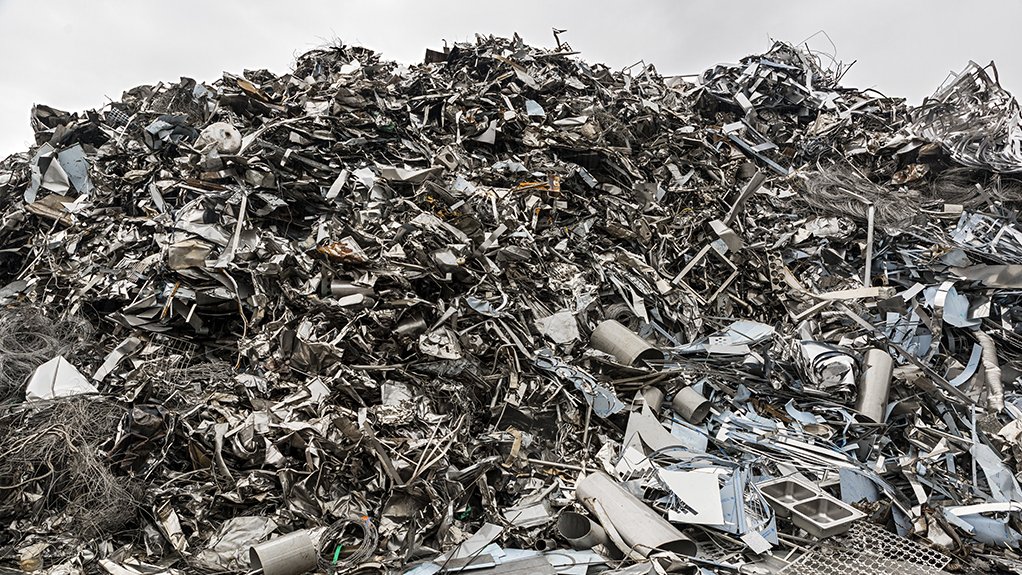Lockdown further strains stainless steel recycling


SIGNIFICANCE OF SCRAP The cost of recycled stainless steel is much less than that of virgin primary alloys
Prior to the national lockdown, South Africa’s stainless steel recycling industry was under strain, facing a dramatic drop in available recycling material and increasing input costs, says Johannesburg-based stainless steel recycler Cronimet director Bernard Maguire.
The stainless steel recycling industry depends on the manufacturing industry, with the country’s stainless steel manufacturers not performing optimally before the lockdown, he notes.
Substantiating his sentiment, Maguire says the Southern Africa Stainless Steel Development Association’s latest statistics indicate a 19% decline in primary product consumption in South Africa when comparing February 2019 with February 2020.
Consequently, the introduction of the national lockdown on March 27 had a significantly negative impact on the recycling industry, and its extension on April 9 exacerbated the problem, states Maguire.
“It was, therefore, great news when government announced shifting to Level 4, as it included and allowed the recycling industry to reopen, although only at 50% capacity.”
Maguire explains that there are two identifiable sources of stainless steel scrap. New scrap, which is sourced from numerous manufacturing industries – such as the automotive, food and beverage, and architecture sectors, as well as tube manufacturers – and old scrap, which is sourced from the demolition of plants, and end-of-life equipment from refineries, mines, and food and beverage plants, besides other sources.
The chemical properties of recycled stainless steel make it an important component for stainless steel mills and foundries as a secondary raw material.
The cost of recycled stainless steel is much less than that of virgin primary alloys, such as chrome, nickel and iron, which are used to make stainless steel, creating consistent demand for recycled stainless steel.
Further, the favourable energy costs involved and carbon dioxide (CO2) released during the recycling of stainless steel, compared with the production of the material from virgin raw material, is a great advantage for mills.
There are studies that estimate that if 304 stainless steel was made from 100% recycled stainless steel, energy use would be about 67% less than virgin-based production and CO2 emissions would be reduced by about 70%.
However, the devastating effects on global economies of the Covid-19 pandemic have made it exceptionally difficult to make any meaningful plans and predictions regarding stainless steel recycling, Maguire highlights.
Government’s pronouncements to ensure that the manufacturing industry can be revived in a way that will potentially result in an exponential increase of production and employment is encouraging, but the timing is indicative of an emotional versus scientific debate, he adds.
Article Enquiry
Email Article
Save Article
Feedback
To advertise email advertising@creamermedia.co.za or click here
Press Office
Announcements
What's On
Subscribe to improve your user experience...
Option 1 (equivalent of R125 a month):
Receive a weekly copy of Creamer Media's Engineering News & Mining Weekly magazine
(print copy for those in South Africa and e-magazine for those outside of South Africa)
Receive daily email newsletters
Access to full search results
Access archive of magazine back copies
Access to Projects in Progress
Access to ONE Research Report of your choice in PDF format
Option 2 (equivalent of R375 a month):
All benefits from Option 1
PLUS
Access to Creamer Media's Research Channel Africa for ALL Research Reports, in PDF format, on various industrial and mining sectors
including Electricity; Water; Energy Transition; Hydrogen; Roads, Rail and Ports; Coal; Gold; Platinum; Battery Metals; etc.
Already a subscriber?
Forgotten your password?
Receive weekly copy of Creamer Media's Engineering News & Mining Weekly magazine (print copy for those in South Africa and e-magazine for those outside of South Africa)
➕
Recieve daily email newsletters
➕
Access to full search results
➕
Access archive of magazine back copies
➕
Access to Projects in Progress
➕
Access to ONE Research Report of your choice in PDF format
RESEARCH CHANNEL AFRICA
R4500 (equivalent of R375 a month)
SUBSCRIBEAll benefits from Option 1
➕
Access to Creamer Media's Research Channel Africa for ALL Research Reports on various industrial and mining sectors, in PDF format, including on:
Electricity
➕
Water
➕
Energy Transition
➕
Hydrogen
➕
Roads, Rail and Ports
➕
Coal
➕
Gold
➕
Platinum
➕
Battery Metals
➕
etc.
Receive all benefits from Option 1 or Option 2 delivered to numerous people at your company
➕
Multiple User names and Passwords for simultaneous log-ins
➕
Intranet integration access to all in your organisation

















